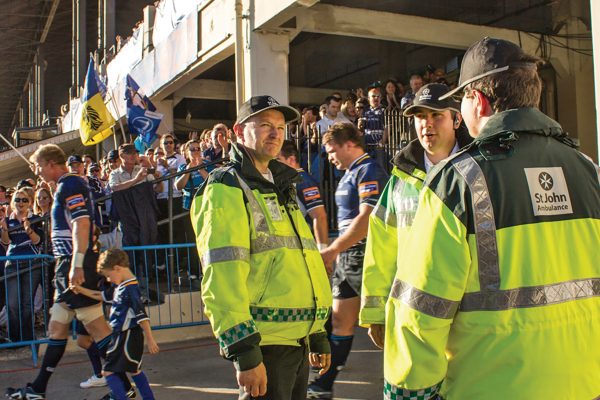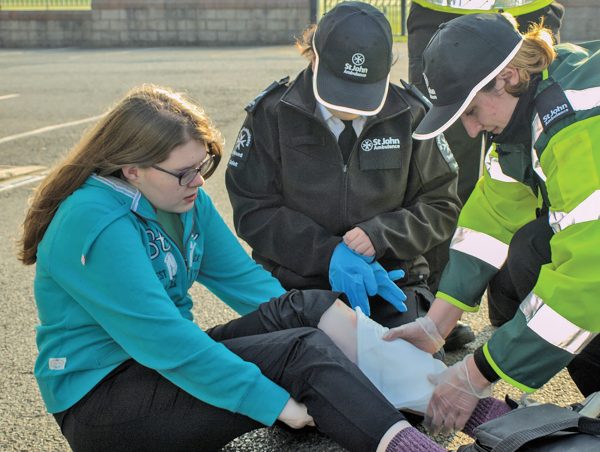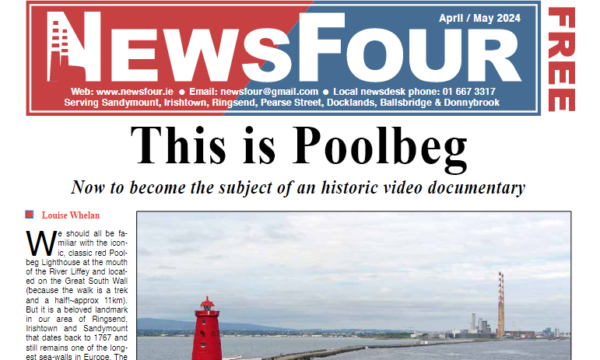
Above: St John’s Ambulance volunteers on duty at Leinster Rugby match.
Although many people at some time in their lives have done a first aid course, either through employment or necessity, having the know-how and confidence to take control when those skills are needed will depend on the time since you were last trained.
St. John’s Ambulance, who have their headquarters on Upper Leeson Street, provide emergency care training to the public. Paul Downes, who has volunteered with them for 40 years and who is now their Director of Central Organization Support, allowed NewsFour some insight into an organization that relies on donations to keep its operations intact, and has done so for over 100 years.
St. John’s provide different types of courses, including a first-aid refresher course that must be taken every two years in order for someone to be qualified, and a parent/toddler course that Downes said is “proving to be very popular at the moment with the drive being ‘It’s something I need to do’”.
With a mission statement such as, ‘we want to ensure that nobody is left anywhere without medical attention,’ St. John’s Ambulance are busy throughout the year, contracted for live events such as matches and runs – the Dublin Marathon being their biggest one.
This emergency care organization recruit volunteers from the age of 11 as cadets but not all stay. As Downes explains: “When they reach adulthood, it’s a pivotal point in their lives with pressures of life, college and work, but those who do remain and do so up to the age of 24 are recognized with a transitional medal which is highly regarded within St. Johns.”

Above: Volunteers going through a first aid training exercise
Photos courtesy of St John’s Ambulance.
Downes informed NewsFour that St. John’s train people to deal with the up and down of the rush of adrenaline and that responders need to be mindful that “you’re not a superhero, which is an immediate thought. You have to have realistic expectations. Managing your own well-being is a priority.” Downes also commended the bystanders and the fire rescue boats that helped pull himself and the unconscious man out of the Liffey.
Cardiopulmonary resuscitation (CPR) and the use of an Automated External Defibrillator (AED) are included in the basic first aid course with St. John’s. In addition, it has training to help patients that have suffered sports injuries like sprains and fractures. Downes explained what exactly you are doing to the patient’s heart while carrying out CPR and using an AED: “The heart can occlude so much blood due to its size and with the arteries being so narrow. By doing CPR you are changing the thoracic pressure in order to keep the blood flowing, and if you use an AED you are reading the patient’s ventricular fibrillation and ventricular tachycardia and then resetting the heart which allows the heart’s own internal pacemaker to take over.”
NewsFour asked Downes how the trainees are taught to cope with a tragedy. “In instances like cot death or such tragic events, your nurturing nature can take over and this is where you need to have empathy rather than sympathy. With empathy you can step back and understand, whereas with sympathy it can bring you deeper in and have an effect on what you do, and all this is a core part of our training,” Downes explained.
St John’s are a volunteer organisation. If you are interested in volunteering or wish to receive training, please visit:www.st.john.ie. Donations are warmly appreciated.
By Paul Carton



